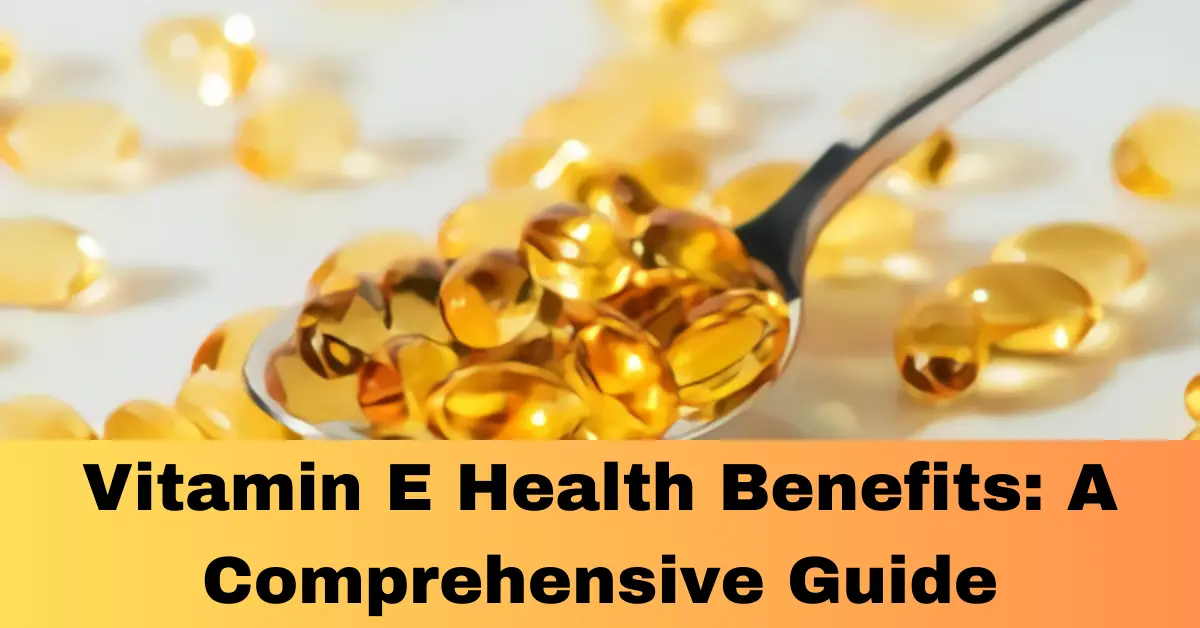Introduction
Welcome to our comprehensive guide on Vitamin E! You may have heard about this essential nutrient in the context of skincare or supplements, but its benefits go far beyond that. Vitamin E is a powerful antioxidant that helps protect our cells from damage caused by harmful molecules called free radicals. Found naturally in various foods and available as a supplement, Vitamin E plays a crucial role in supporting overall health, from skin and heart to immune function and beyond.
In this article, we’ll explore the numerous health benefits of Vitamin E in detail, examine its sources in everyday foods, discuss supplement options, and provide essential tips for incorporating it into your diet. Whether you’re looking to enhance your skin’s radiance, support your heart health, or boost your immune system, understanding Vitamin E can help you make informed choices for a healthier lifestyle.
Vitamin E Health Benefits: A Comprehensive Guide
Vitamin E is renowned for its wide-ranging health benefits, primarily due to its antioxidant properties. Let’s explore how this essential nutrient can positively impact various aspects of your health:
1. Antioxidant Powerhouse
Wellhealthorganic.com:vitamin-e-health-benefits-and-nutritional-sources acts as a potent antioxidant in the body, neutralizing free radicals that can cause oxidative stress. By protecting cells from damage, it helps maintain overall cellular health and may reduce the risk of chronic diseases.
2. Skin Health
One of the most well-known benefits of Vitamin E is its ability to promote healthy skin. It supports skin hydration, elasticity, and reduces inflammation. Vitamin E is commonly used in skincare products for its anti-aging properties, helping to diminish wrinkles and improve skin texture.
3. Heart Health
Studies suggest that Vitamin E may play a role in promoting heart health by preventing the oxidation of LDL cholesterol, which contributes to arterial plaque buildup. It also helps maintain healthy blood vessels and circulation, potentially reducing the risk of cardiovascular diseases.
4. Immune Function
Vitamin E supports the immune system by enhancing the function of immune cells and helping to regulate immune responses. It may aid in protecting against infections and maintaining overall immune health.
5. Eye Health
Maintaining adequate levels of Vitamin E is essential for optimal eye health. It helps protect the cells of the eyes from free radical damage and may reduce the risk of age-related macular degeneration, a leading cause of vision loss in older adults.
6. Cancer Prevention
While more research is needed, Vitamin E’s antioxidant properties suggest a potential role in reducing the risk of certain cancers. It works alongside other antioxidants to neutralize free radicals that can damage DNA and lead to cancerous changes in cells.
7. Brain Health
Vitamin E may support cognitive function and reduce the risk of neurodegenerative diseases like Alzheimer’s. Its antioxidant properties help protect brain cells from oxidative stress and inflammation, contributing to overall brain health.
Incorporating Vitamin E into your diet through foods rich in this nutrient or supplements, when necessary, can help you reap these health benefits and support your overall well-being.
Why is Vitamin E Important?
1. Essential Antioxidant Protection
Cellular Defense: Vitamin E is crucial for protecting cells against oxidative damage caused by free radicals, unstable molecules that can harm cells and contribute to aging and disease.
Overall Health Support: By neutralizing free radicals, Vitamin E helps maintain the integrity of cell membranes and DNA, supporting overall cellular health and function.
2. Skin Health and Beauty Benefits
Skin Repair: Vitamin E plays a vital role in promoting skin repair and regeneration, making it essential for maintaining smooth, healthy skin.
Anti-Aging Properties: Its antioxidant properties help reduce the appearance of wrinkles, fine lines, and other signs of aging, keeping skin youthful and radiant.
UV Protection: Vitamin E can protect against UV-induced damage, although it should not replace sunscreen but can complement sun protection measures.
3. Heart and Cardiovascular Support
Cholesterol Protection: Vitamin E helps prevent the oxidation of LDL cholesterol, which can lead to plaque buildup in arteries and increase the risk of heart disease.
Blood Vessel Health: It supports healthy blood vessels, promoting efficient blood flow and reducing the risk of cardiovascular conditions like heart attacks and strokes.
4. Immune System Boost
Enhanced Immune Response: Vitamin E enhances the function of immune cells, helping the body defend against infections and illnesses.
Inflammatory Regulation: It may play a role in reducing inflammation, which is crucial for maintaining a balanced immune response and overall health.
5. Eye Health Maintenance
Vision Protection: Vitamin E protects cells in the eyes from oxidative damage, potentially reducing the risk of age-related eye diseases such as macular degeneration.
Eye Tissue Integrity: It supports the health and integrity of eye tissues, contributing to optimal vision and eye function throughout life.
6. Potential Cancer Prevention
Antioxidant Defense: Alongside other antioxidants, Vitamin E may help protect against oxidative damage to cells that can lead to cancerous changes.
Research Continues: Ongoing studies explore Vitamin E’s potential role in reducing the risk of certain cancers, although conclusive evidence is still developing.
7. Brain Health and Cognitive Function
Neuroprotection: Vitamin E’s antioxidant properties help protect brain cells from oxidative stress, potentially reducing the risk of neurodegenerative diseases like Alzheimer’s.
Cognitive Support: It may support cognitive function and memory, contributing to overall brain health and mental acuity as we age.
Frequently Asked Questions (FAQs) About Vitamin E
1. What foods are rich in Vitamin E?
Nuts and Seeds: Almonds, sunflower seeds, and hazelnuts are excellent sources.
Vegetable Oils: Such as sunflower, safflower, and wheat germ oil.
Leafy Greens: Spinach, kale, and Swiss chard contain Vitamin E.
Fortified Foods: Some cereals, juices, and spreads may be fortified with Vitamin E.
2. Can Vitamin E improve my skin?
Yes! Vitamin E is known for its skin benefits. It can help moisturize, reduce inflammation, and protect against UV damage when applied topically or consumed in your diet.
3. How much Vitamin E do I need daily?
The recommended daily intake for adults is around 15 mg (22.4 IU) of Vitamin E per day. This can be easily achieved through a balanced diet that includes nuts, seeds, and leafy greens.
4. Are there any risks of taking too much Vitamin E?
Excessive intake of Vitamin E from supplements can cause side effects like nausea, diarrhea, and in rare cases, serious complications. It’s best to follow recommended doses and consult with a healthcare provider if you’re considering Vitamin E supplements.
5. Can Vitamin E prevent heart disease?
Vitamin E’s antioxidant properties may help protect against heart disease by preventing the oxidation of LDL cholesterol, which contributes to plaque formation in arteries. However, more research is needed to confirm its role in heart disease prevention.
6. Is Vitamin E safe to take during pregnancy?
Yes, in recommended amounts. Vitamin E is important for fetal development and can be obtained through a healthy diet. Pregnant women should consult their healthcare provider before taking Vitamin E supplements.
7. Can Vitamin E supplements improve my immune system?
Vitamin E supports immune function by enhancing the activity of immune cells. Including Vitamin E-rich foods in your diet can contribute to a healthy immune system, but supplements should be taken cautiously and under medical guidance.
Conclusion
In conclusion, Vitamin E is a powerful antioxidant that offers a range of benefits for your health. From supporting skin health and protecting against heart disease to boosting immune function and potentially reducing the risk of certain diseases, Vitamin E plays a crucial role in maintaining overall well-being. You can easily incorporate Vitamin E into your diet through foods like nuts, seeds, and leafy greens, or consider supplements under medical guidance if needed. By understanding its importance and incorporating it wisely, you can enhance your health and enjoy its protective benefits for years to come.






